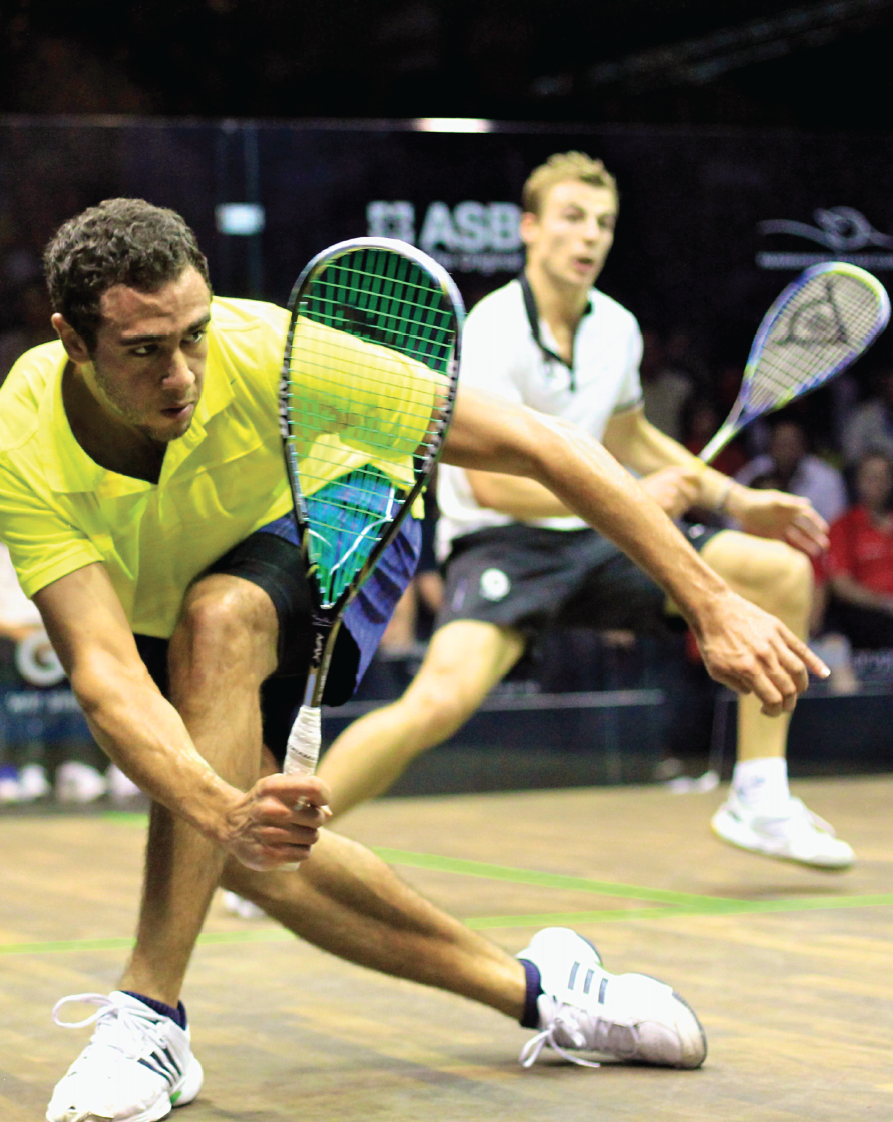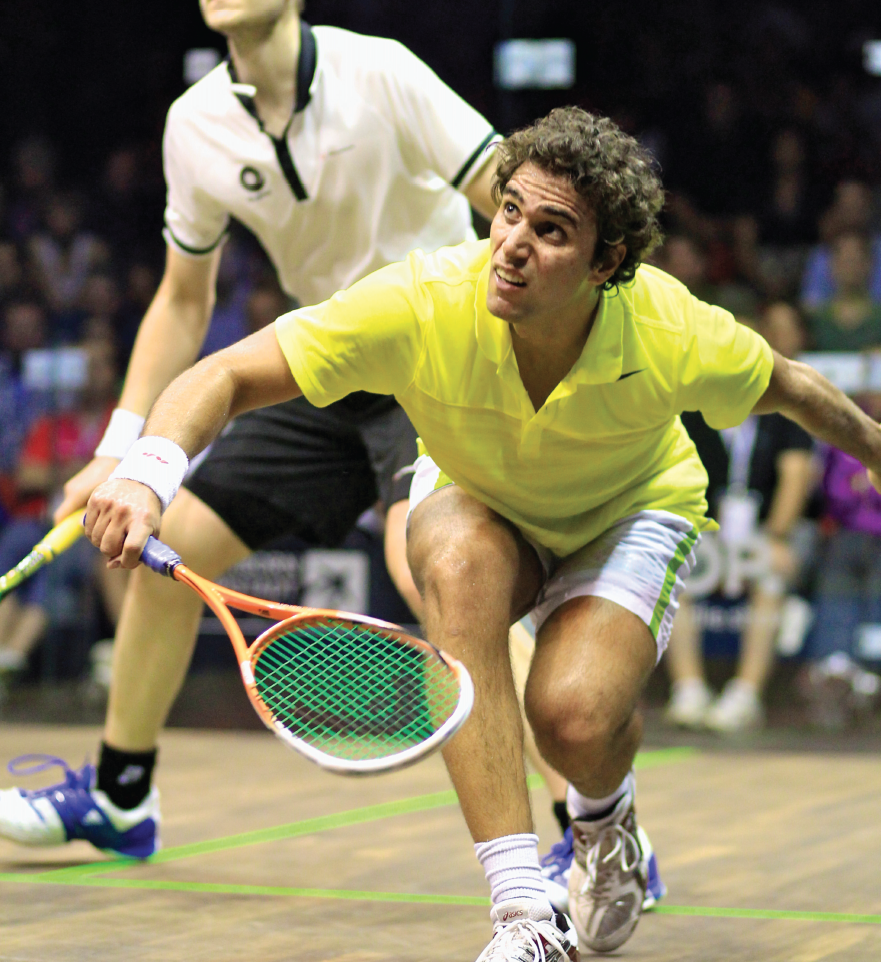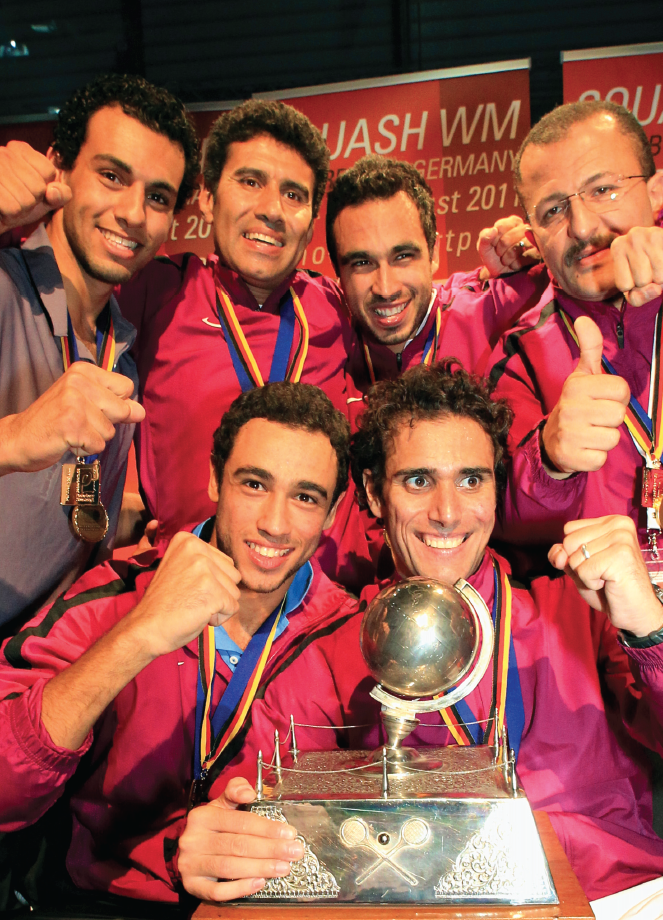By Richard Eaton
Photos by Steve Line/Squashpics.com
You may imagine how much it means to the morale of some Egyptians—with thousands having risked their lives for a better world and uncertainties remaining about where their courage will lead them—for their nation to win a world title at this time.
Head coach Amir Wagih says he promised his government that he would bring the world team trophy back to Egypt again—a questionably brave thing to say, considering his squad did not have its best known player and were far from favorites to beat England in the final.
And when Karim Darwish was set to play a world title decider against someone he had not beaten for five years, Wagih’s boldness began to look more like rashness.

“Every day they were asking me if we were going to bring it back again,” Wagih said. “I think very few people were betting on us being victorious. But I said on finals day that we would. I knew that we could do it.”
How many others knew that as Darwish walked on court with James Willstrop in picturesque Paderborn for one of the most important matches of his career? Probably very few.
The former World No. 1 sometimes feels too unsure of himself to deliver when it matters, and Darwish’s five-game semifinal loss to the 35-year-old Frenchman, Thierry Lincou, the day before seemed to underline this weakness.
But he more than made amends. With a well-designed and excellently controlled display Darwish scored a 5-11, 13-11, 9-11, 11-4 win over Willstrop that carried Egypt to an unlikely 2-1 win, triggering a team embrace in which Darwish looked as though he had been swallowed by a whale. “There was a lot on my shoulders,” Darwish acknowledged. “I was playing for my country and not for myself, so there was a lot of pressure—but I tried not to think about that.”
How did he manage it? “I tried to tell myself to enjoy the match, to pretend that it was a normal match and not a special one,” he said. “Experience helps. But even so, it can be very hard.”
Darwish also knew that he needed to be patient against such a fine shot maker and to move the big man around. Equally important, he responded well during a couple of pivotal phases.
One happened when Willstrop reached game ball in the second game, at 10-9 and 11-10. Had the Englishman leveled the match then he might have taken charge.
On the first of these Darwish was helped by the award of a penalty stroke, and on the second he tried a tight little trickle boast, and saw it scuttle round the front court walls for a winner.
The other happened at 4-4 in the fourth game, when Willstrop was climbing back into the match. This time Darwish delivered his very best squash.
In his loss to Lincou he had, he knew, been too careful. This time he was determined to take the initiative, and did so superbly, taking seven tremendous points in a match-winning sequence.
“I think at the end I produced superb squash,” said Darwish, not a player usually given to puffing himself up. “I am really proud I did that.”
There had been little body language to suggest this would happen. Amidst the pre-final fanfare, England’s large group had come united into the arena, looking smart and ready.
Egypt had had strolled in far less martially, and Ramy Ashour, unpredictable as ever, bounced in late. How misleading these appearances were.
Ashour was truly brilliant. He beat Nick Matthew, the World No. 1 and World Open champion, by 11-7, 11-9, 14-12— the first time he had ever beaten him in straight games.
The young Egyptian was ruthlessly attacking in the first half of the match, although gradually Matthew began to contain him, making some breathtaking retrieves that led to an exhilarating finish. It also contained bile and controversy.
Amidst some aggressively disputed refereeing decisions, Matthew twice left the court thinking he had won the third game. He claimed afterwards that “I was not allowed to play the third game,” reckoned that “everyone saw what happened,” and alleged that “there was a bit of injustice here.”
Matthew also once pointed to someone in the Egyptian camp, calling out “you’re not the ref,” and there were even moments when the coaches on each side appeared to have words with one other.

Ashour claimed that “it was like being in a UFC bout,” though he later gave the contretemps a certain perspective. “We are playing for our country and we are both eager to win—and to die on court if needed,” he said.
Was this the most exciting triumph he had ever experienced, Wagih was asked? “Of course,” he replied. “We were worried about this event. But these boys were very special. Though we won last time, Nick Matthew was injured then. And this time we were without Shabana.”
Which raised the mystery behind the absence of the sport’s best known active male player. Was it related to Egyptian politics? Or had Shabana merely been unfit? Did it mean that the career of the four times former World Open champion is near its end?
The answers clearly have something to do with Shabana’s decision to remain in the United States after the Egyptian revolution began in February. But what else is involved is not clear at all.
Different versions emerged. Shabana apparently told the President of the Egyptian Squash Federation, Assem Khalifa, in August that “I am training now in the United States and I will be there in Cairo to join my teammates,” and added: “I would never miss a chance to represent my country at any tournament.”
According to another news item, in Al Ahram on-line, Shabana “exaggerated” his financial demands, which seemed to imply this as a reason for his exclusion. But Wagih never admitted this as an issue.
“I have never doubted Shabana’s loyalty or love for Egypt,” the head coach was quoted before the tournament. “The national team needs his efforts and experience to clinch the title as we did in Denmark in 2009.”
But when Squash Magazine spoke to Wagih after the tournament, he said he had “not been able to take the risk” with Shabana because he had been out of action so long. It had been six months since Shabana had competed on the PSA Tour, last playing at the North American Open at Richmond.
And so Hisham Ashour, Ramy’s popular elder brother, and Mohammed El Shorbagy, the former world junior champion, made up the Egyptian quartet instead.
Although Hisham lost in straight games to Peter Barker against England in the final, it had not quite been a two-man team, for El Shorbagy dug the Egyptians out of a hole in the semis against France.
All this drama was well-matched by the arena presentation of a tournament that had been good enough for some players to describe it as the best they had ever played in.
The new ASB court had larger wall panels. There were electronic messages moving around the top of the court, giving the crowd scores, updates, and ads. The floor was more forgiving on the legs, something Gregory Gaultier especially commented on, calling it “the best court I have ever played on.”
The opening ceremony included three parachutists descending from the sky with the flags of Paderborn, Germany, and the WSF, skillfully managing to avoid landing in the fountains.
It continued amidst the ancient vibes of a community founded by the emperor Charlemagne back in AD795, but with an indoors ambience made modern by innovations in music and lighting between matches.
It ended with the WSF President “Ramy” Ramachandran saying the tournament had “raised the bar,” and there was fair reason to believe his words were not merely an expression of protocol.
More than 7,000 spectators watched throughout the week, and about 110 countries took live streaming in HD. With 32 countries participating, many of them with larger squads, it also claimed to be the biggest squash tournament yet.
The United States’ 7th place was the best since 1983, and Denmark’s 13th their best ever. The leading Danish player is Kristian Frost, who prefers not to be compared with his once famous dad, Morten Frost, but it arguably needs mentioning once.
Morten was an outstanding World No.1 at badminton in the eighties—and so good that he is legendary in parts of Asia and remains a national hero. This, perhaps, makes it understandable that 22-year-old Kristian should choose another racquet sport. He is ranked in the 60’s and rising.
The United States’ climb of five places from 2009 saw Julian Illingworth, Chris Gordon, and Todd Harrity all play consistently well, and Gilly Lane get a good win against Switzerland.
They began with victories over Ukraine and the Swiss before losing to an Italian team beefed up by the expatriate Englishman Marcus Berrett, but they qualified from their group anyway.
They then scored a fine win over seventh-seeded Canada in the last 16. Harrity, the 20-year-old from Philadelphia, put United States ahead, inflicting a first defeat of the tournament on Andrew Schnell by beating the Calgary man 13-11, 11-7, 7-11, 11-4.
Illingworth, the World No. 32 from New York, then ensured the United States’ place in the quarterfinals with a great recovery to beat Shahier Razik, a career- long rival, by 6-11, 3-11, 11-2, 11-0, 11-5. “It doesn’t get much better than that,” said US national coach Paul Assiante.
Harrity also took a game off Hisham Ashour before the US went down predictably by 3-0 to Egypt. The playoffs saw more strong performances, bringing a loss with honour to a powerful Malaysian team, and a fine 2-0 success over India that included an excellent four-game win for Illingworth over Saurav Ghosal, the World No. 26.
The biggest flops were Pakistan, who failed to reach the top 16 for the first time— a sad fall given their immensely brilliant squash tradition. It prompted Jahangir Khan, their greatest legend, to call for the resignation of those running squash in his country.
Just before the semifinals, Wagih made a much-publicized detrimental comment about France and England. It immediately looked as though it might backfire, but didn’t quite.
“England, like France, has a very strong team but in two or three years there will be no one there,” he asserted provocatively.” They are all around 30 (years old) and won’t be there at the top.”
It was followed by Egypt surviving narrowly by 2-1 in the closest of tussles with France, while England appeared quite impressive during a 3-0 win in their semifinal against Australia. Egypt’s escape only came after El Shorbagy fought through five games to get past Mathieu Castagnet in the decider.
Neverthless, Wagih may be right. The future may well belong to Egypt. There is, though, one shred of doubt, which may materialize from unpredictable events well away from any squash courts.
This was articulated by Darwish, when he was asked if his team had been inspired to their tremendous performance in the final by the transformative seven months in Egypt.
“It didn’t affect us, because sport is away from politics,” Darwish said, and then added a sting in the tail. “But maybe in future it will affect the sport.”





